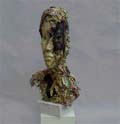|
JHOM - Worry - Introduction
JHOM - Worry - Intro


| Michele Klein brings her training in psychology
and love of all things Jewish to the notion of worry -- the normal,
everyday angst that we all feel to varying degrees. She explores the
ways in which Jews have experienced, expressed, and coped with it since
biblical times right up to the post-9/11 present. The entire Topic of
the Month "WORRY" is excerpted from Michele Klein, Not to
Worry: Jewish Wisdom and Folklore (JPS 2003). |
"We are distressed about the past, perturbed about the
present, and frightened about the future," observed a Jewish poet, Jedayah
Bedersi "Ha-penini," in Provence, in the early fourteenth
century, meditating on human nature.[1]


Is
anxiety just in the mind? Meira Grossinger.
Head with Inner Eye, 1999.
Newspaper, net, wire.
68 x 40 x 38 cms |
|
|
|
Bedersi used the term mitatzev for his emotion about
the past, bahalah for distress about the present, and yirah
for trepidation about the future. Elsewhere in his treatise he used also pa-had,
eymah, and be'atah — biblical words for fear and strong
anxiety. There is a gamut of more than a dozen Hebrew words in the Jewish
sources that express apprehensive emotion, the feeling of worry, the sensation
of anxiety, as well as the process of becoming fearful. These words are used
in different contexts in the Torah, rabbinic texts, and again in modern Hebrew
today. They depict long-term and short-lived anguish, situation-specific and
diffuse anxiety, and rational and irrational fear. They refer to moral, social,
and existential worrying, also fear of suffering and death. The gamut stretches
from mild fretting to panic, from trembling anguish to numbing dread.
Some Jews had a special vocabulary for disturbing emotion in
the vernacular that differentiated between various anxiety disorders. Thus,
for example, in Moroccan Judeo-Arabic, shakikah refers to fear, usually
noticed in women with hysterical symptoms, quite different from hatfa,
the "snatched heart" experienced by men who have been out alone
in the dark. Other Judeo-Arabic words refer to a trembling fear caused by
an evil spirit, a disease of the imagination (possibly what we now call "paranoia"),
and a panic attack.
Iraqi and Yemenite Jews use hofah for fright; Iraqis
also use the word tarkah, and Yemenite Jews use the word fadja,
for different anxiety disorders, each calling for its own folk remedy. Iraqi
Jews have compared a constant worrier to a chicken in the hen house, constantly
afraid of the jackal and the wolf; "Come the jackal, come the wolf"
denotes one who lives in constant dread. Yiddish speakers draw on both German
and Hebrew, using zorge, angst, and de'agah for anxiety
and worry, as well as the more general term for distress and anguish, tzuris.
 |
[1] Jedayah Bedersi (Ha-penini), Be-hinot olam,
trans. Tobias Goodman (London: 1806), chapter13. See also chapters 15,
18, and 19 on worry, fear, and anxiety.
|
 |
 Michele
Klein, Not to Worry: Jewish Wisdom and Folklore (Jewish Publication Society
2003). Michele
Klein, Not to Worry: Jewish Wisdom and Folklore (Jewish Publication Society
2003). |
 |
Michele Klein has a Ph.D.
in psychology and has been researching Jewish customs and folklore for
many years. Her previous book (JPS), A Time to Be Born: Customs and
Folklore of Jewish Birth, won a National Jewish Book Award. |
|
|
|
|



